Philly Mag’s Favorite Long Reads of 2024
Mob-associated loan sharks, peonies, crock-pot cookbooks, and investigations into Philadelphia’s biggest institutions. It’s our roundup of our favorite stories from 2024!
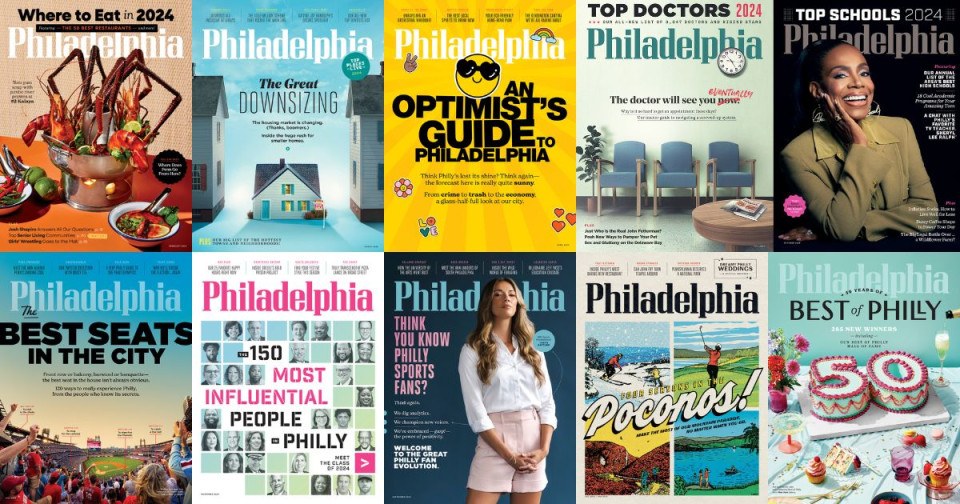
Settle in with some great Philadelphia magazine long reads from 2024.
What do mob-associated loan sharks, peonies, and crock-pot cookbooks have in common? Absolutely nothing! But they all are integral to some of Philadelphia magazine’s best features of 2024.
Every year, Philly Mag has a few dozen opportunities to bring readers longform features, ones that transport our audience into the courtrooms, backrooms, barrooms, and locker rooms of our fine region. Here are a dozen of our staff favorites, and check out our full archive here.
The Inside Story of the University of the Arts’s Stunning Collapse

Photo-illustration by Leticia R. Albano
The news was shocking. It was a Friday afternoon, the last day of May, and suddenly everyone in the city was talking about one thing: The University of the Arts was shutting down. Immediately.
After the initial wave of despair, one thought consolidated: How the hell could this happen? And to that question, UArts administrators had no answer. They canceled town halls with students and staff. They dodged reporters. In a statement, the school’s president and chair of the board of trustees said, “With a cash position that has steadily weakened, we could not cover significant, unanticipated expenses” and little more. But there had to be more, right?
Writer-at-large David Murrell found the more. Through dozens of interviews and days poring over financial records, Murrell found an institution with puzzling accounting; an overzealous former president; and a faculty, staff, and student body who had no idea things were so bad. Keep reading here.
How Philadelphia Became Obsessed With Twisted Tea
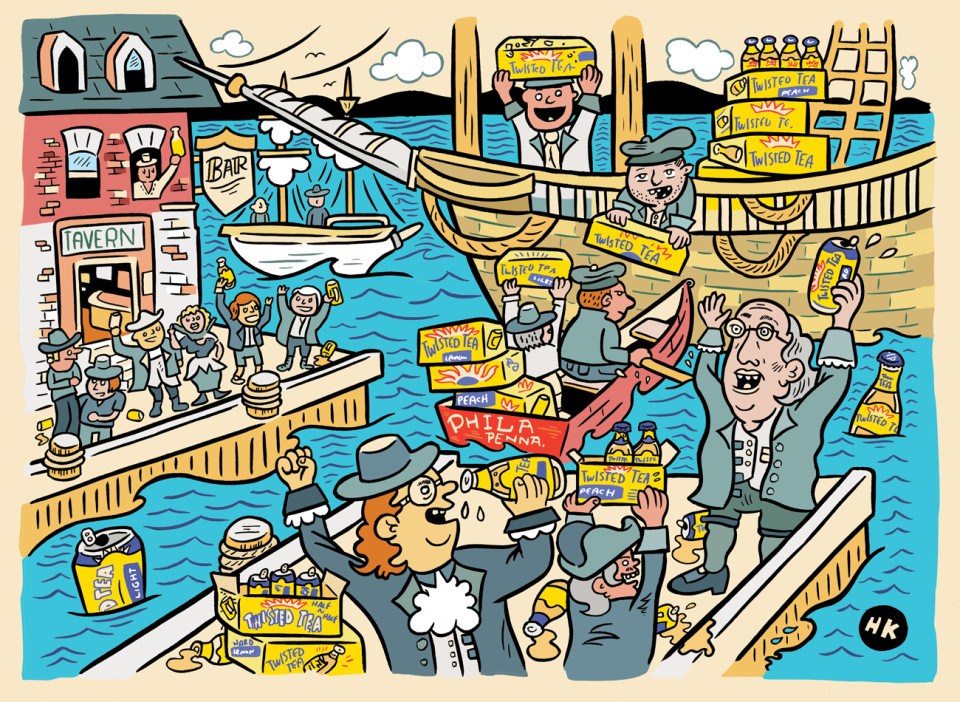
Illustration by Hawk Krall
Jim Koch had a problem. It was 2001, and no one was drinking the Boston Beer Company founder’s newest creation, a malt beverage called Twisted Tea. The marketing was all off, he later admitted, and he couldn’t find the right market for the product.
Rather than give up, he gave it one last push, shifting the marketing focus from upper-income folks in their 20s and 30s to blue-collar workers—construction workers, plumbers, electricians. And, even more important, he found where those workers lived: Philadelphia.
As features editor Bradford Pearson discovered, Philadelphia is now the number-one market in the world for Twisted Tea Light. The city’s obsession with the hard tea has occasioned Twisted Tea tattoos, Twisted Tea softball team uniforms, and Twisted Tea–themed bachelorette parties. The city’s sweet love for the drink spans generations and has become ingrained in the city’s culture. For the first time, Pearson investigated the roots of the region’s obsession, tracing its origins back to a summer of no-shower happy hours in North Wildwood.
The tale — though it started in Boston — is uniquely Philadelphian.
“We take the little cast-offs and discards, and we make them our own,” Pearson wrote. “Over a century ago, we took last night’s leftover meat and veggies, slapped them into some bread, and — poof — we created the hoagie. Twenty years ago, when no one else wanted it, we welcomed Twisted Tea with open mouths, and now it’s ours.” Keep reading here.
Fight Like a Girl: The New Wave of High-School Wrestling

Photography by Hannah Love Yoon
Four years ago, if you were a high-school girl in Pennsylvania and interested in wrestling, you were out of luck. Wrestling was a boys’ sport, people said — too violent, too gruesome, too masculine for girls.
Well, that’s all changed. In March of 2020, a group of interested women created an organization, SanctionPA, intended to get girls’ wrestling sanctioned by the state and thus made an official sport. Then something totally unexpected (or totally expected, depending on your perspective) happened: Girls’ wrestling exploded. By February 2023, 100 high schools had formed teams. Now, 185 schools statewide feature varsity girls’ wrestling.
Writer-at-large Emily Goulet explored the fascinating world of girls’ scholastic wrestling and revealed just how deeply meaningful the sport is to the young women making history as its first state-sanctioned competitors. It turns out that — surprise, surprise — the same aspects of the sport that attract boys (it tames the overflowing emotions of high school; it helps manage depression, anger and anxiety; you get to beat people up) also appeal to girls. Who knew? Keep reading here.
How One Philadelphia Prison Could Change Incarceration in America
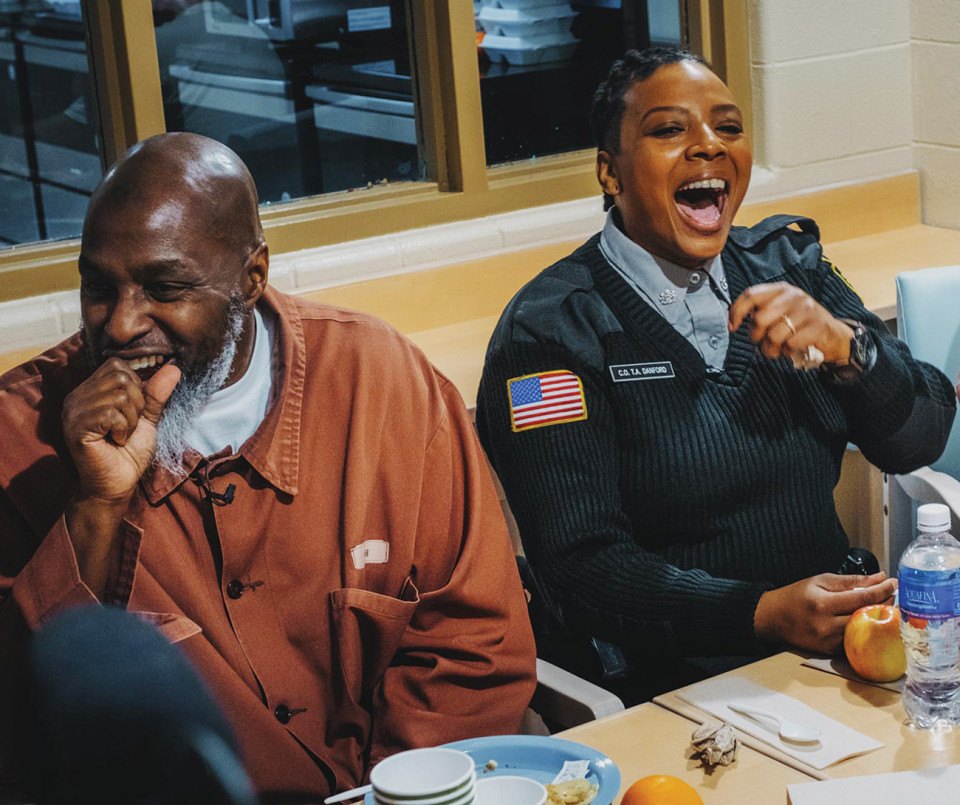
Photograph by Swedish Television SVT/John Stark
America’s prisons don’t work. They’re overcrowded, understaffed, and wildly expensive, and high recidivism rates prove that there is very little rehabilitation happening in our nation’s ever-expanding prison-industrial complex. Prisons in America excel mainly at doling out punishment and suffering.
The understanding that suffering doesn’t lead to rehabilitation, though, is the big idea behind a type of prison reform that’s been adopted in Norway and Sweden, one that centers dignity, humanity, and rehabilitation. The countries that have made these reforms have seen a stunning drop in recidivism rates.
Contributing writer Ben Seal explored a one-of-its-kind partnership between Drexel University and the Pennsylvania Department of Corrections that’s bringing this style of incarceration to the Charlie Alpha block of SCI Chester, a.k.a. “Little Scandinavia.”
Here, just outside of Philadelphia, inmates are afforded a level of dignity and independence unrecognizable in traditional American prisons. They have their own cells sans cellmates. They cook their own meals. They interact collegially with guards, who are called “contact staff” rather than “correctional officers” to reflect a different sort of training.
This has the potential not only to make big changes in the lives of the incarcerated and formerly incarcerated, but to make things better for those contact staff as well. In his story, Seal masterfully explored the power of this quiet revolution. Keep reading here.
Jeff Yass’s Big School Choice Gamble

Illustration by James Boyle
Jeff Yass, the elusive billionaire investor, isn’t just another wealthy individual — he’s a behind-the-scenes force with the power to influence elections and redefine education in America. With his deep pockets and strategic investments, Yass is making a big push for school choice, all while staying largely out of the public eye.
“What we need, what we must have, in Yass’s view, is a marketplace of education, competition that will make our schools so much better, and will also, Yass believes, historically reduce poverty in a city like Philadelphia. It is, indeed, a huge bet,” wrote writer-at-large Robert Huber.
A self-identified libertarian, Yass believes deeply that school choice is the single most important issue for the country. To that end, he has in recent years significantly increased his political donations to right-leaning candidates who support school choice. Yass’s political giving has sparked controversy, such as his support through PACs for an ultimately weak gubernatorial candidate, Bill McSwain, which some say led to the rise of more extreme candidates. Or his recent involvement with Donald Trump, despite Yass’s having previously proclaimed himself a “Never Trumper.”
Critics argue that Yass’s focus on school choice above all else ignores broader implications, namely the other policies of the candidates he supports, yet he remains committed to his vision. “Criticism doesn’t matter, not to Yass,” Huber explained. “Because he believes he is right.” Keep reading here.
Inside Par Funding: The Wild $550 Million Financial Scandal That Rocked Philly and the Main Line
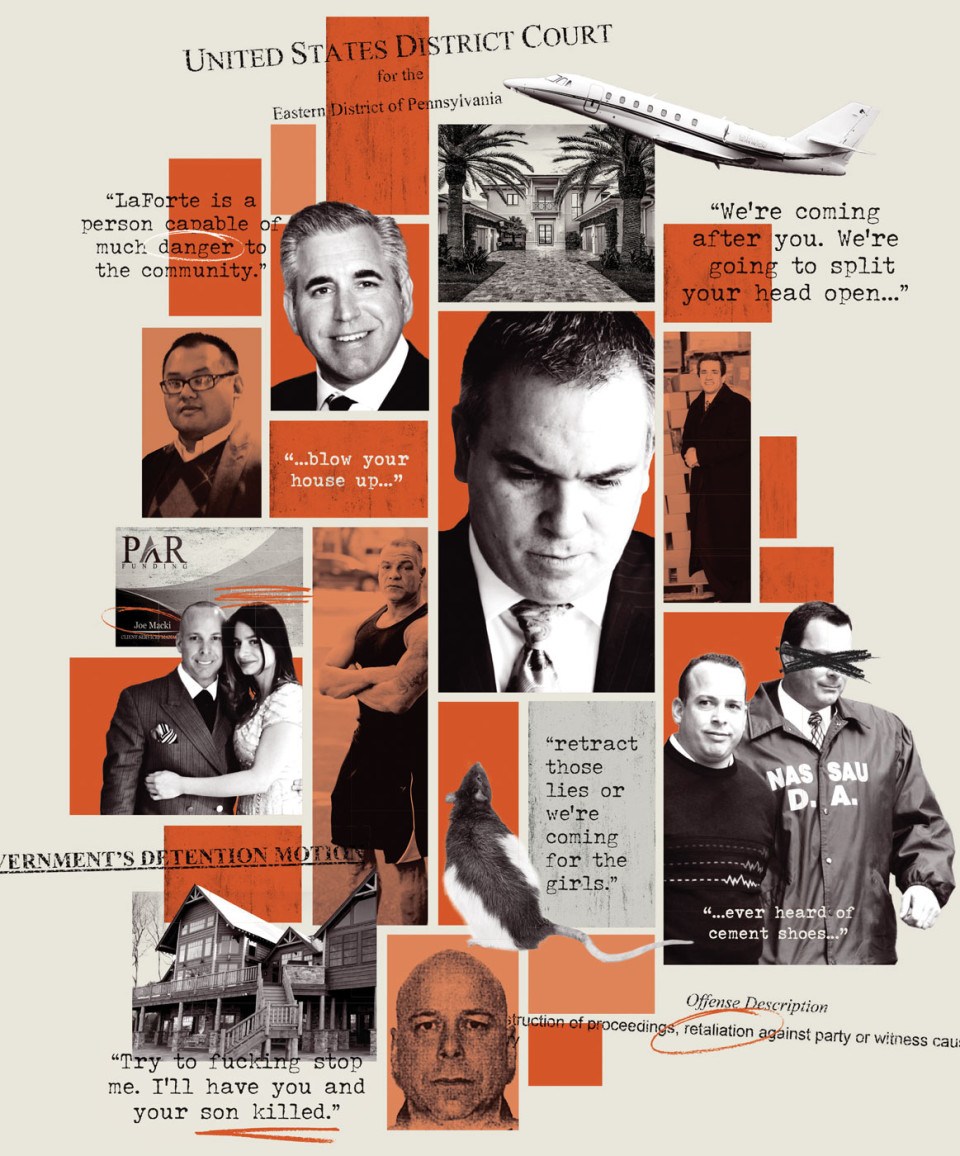
Photo-illustration by Leticia R. Albano
Longtime Inquirer investigative reporter Craig R. McCoy made his Philly Mag debut by unpacking the saga of Par Funding, the Philly-based lending operation whose principals were charged with 63 federal counts of fraud, conspiracy and more. It’s a spine-tingling tale rife with spy-cam footage, mansions, stacks of cash, pricey art, a private jet, a bloody attack, and wild allegations right out of the movies.
The feds said Par ran a $550 million fraud — one of the biggest in Philly history — and that principals lied to investors and gouged borrowers to fund their lavish lifestyles. Par Funding, meanwhile, said the feds — first through an SEC lawsuit and later via a federal indictment — crushed a legitimate business. What’s the truth? Keep reading here.
How I Discovered Philly’s Most Successful Cookbook Author Doesn’t Actually Exist

Illustration by Till Lauer
You probably don’t know the name Luisa Florence. The self-described 60-year-old Philly resident, though, for a stretch of time this year, was possibly the best-selling cookbook author in the region. Her slow-cooker recipe books topped the Amazon charts, and her mastery of cuisines as diverse as traditional African American and Hungarian was genuinely impressive.
So food critic and writer-at-large Jason Sheehan set out to do what any journalist would do in this situation — try to find her, and write about her. And that’s when things got … complicated.
Sheehan’s reportorial journey dragged him from North Philly kitchens to Amazon PR calls with dozens of stops in between, just trying to answer one question: Who the hell is Luisa Florence? As the trail got dimmer and dimmer, the possibility that Florence even existed dimmed as well.
It was a rollicking 21st-century tale of e-commerce, old-fashioned gumshoe reporting, and a frankly stunning number of slow-cooker recipes. Grab a plate and take a seat. Keep reading here.
The New Face of New Hope: How a Small Bucks County Town Became a Playground for the Rich and Famous

Illustration by Laurent Hrybyk
Aspen. Palm Beach. The Hamptons. Glamorous retreats where the well-heeled slip away to avoid, well, the rest of us. But as the shine of those communities has begun to fade — and their prices have soared to astronomical heights — these same folks have been searching for a new escape, a place they can still feel catered to but perhaps put their own stamp on.
And they’ve, inexplicably perhaps, stumbled upon the Delaware River. As writer Maureen Coulter reported, these privileged pioneers are heading to the sleepy, river-straddling towns of New Hope and Lambertville. Bradley Cooper moved nearby. Leonardo DiCaprio and Justin Bieber have been spotted walking the streets. High-end hotels are popping up, and developers are knocking down historic homes along the river and throwing up mega-mansions as Range Rovers and Porsches stuff the driveways.
This new New Hope is a far cry from the dive bars and head shops that used to make up the borough’s main drag. Real estate prices are skyrocketing. Businesses have shuttered, unable to keep up with rents. Long-time locals fear they’re losing the communities they fell in love with in the first place. But Coulter, who herself lives in Lambertville, is optimistic.
“Like they have for more than 300 years, New Hope and Lambertville will evolve — and ultimately thrive,” she wrote.
Who will thrive, though, is the ultimate question. Keep reading here.
Inside the Epic Search for Philly’s Next Tuba Master

Illustration by Pete Ryan
Picture a symphony orchestra. What’s the first instrument that comes to mind? Maybe it’s a violin, or a flute. Some of the more musically minded of you may have said something more esoteric — a timpani, perhaps, or a French horn. Maybe even the bad boy of the woodwinds, the bassoon.
It’s unlikely many of you thought of the tuba. This past spring, the Curtis Institute of Music hosted its rarest competition, a battle for who would become the prestigious school’s sole tuba student. And in an even rarer moment, they let contributing writer Don Steinberg sit in. The result is a tenderhearted ode to the road less traveled, a spotlight on the young musicians who hold down the fort for the rest of the orchestra.
“To me, playing tuba as a life choice is an exquisite act of hope — proof there’s still a place in this clickbait-influencer world for the under-loved specialist in a field with a barely existent job market,” Steinberg wrote. The tubists in an orchestra “pull a heavy load with no glamour, hidden in the back, like a subwoofer behind the couch. Keep reading here.
How Did Penn Get Here?
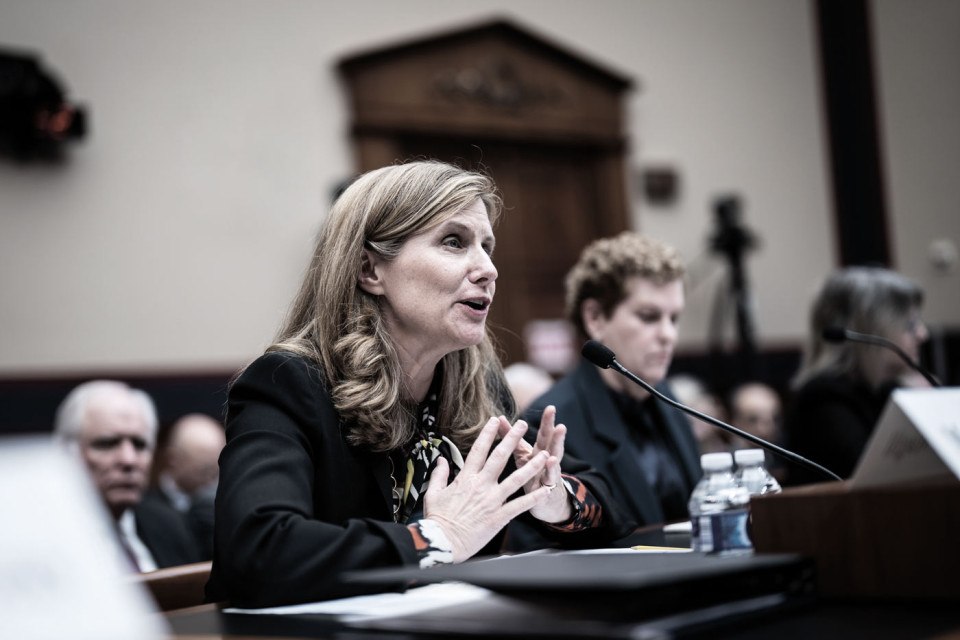
Photograph via The Washington Post/Getty Images
Last December, it would have been hard to watch TV news and miss the face of Liz Magill. The Penn president’s Congressional testimony on rising on-campus antisemitism was seemingly everywhere, as were her weary and unsatisfactory answers on the subject.
And now we all know what that led to: a revolt by some of Penn’s most well-heeled alumni and the eventual resignation of Magill. Contributing writer Tom McGrath looked back not just at the events that led to Magill’s ouster, but at everything leading up to that event. What he found was an institution — the most powerful in Philadelphia — leading a double life. On one hand, it’s a hyper-progressive enclave of academia. On the other, it’s a hyper-capitalist machine that spits more and more students into the financial sector every year.
So how can both these things be true at the same time? The answer, McGrath writes, lies in part in the unbridled ambition of institutions like Penn and, even more, in the world they’ve helped to create. Keep reading here.
Inside Philly’s Flourishing — and High-Stakes — Foraging Scene
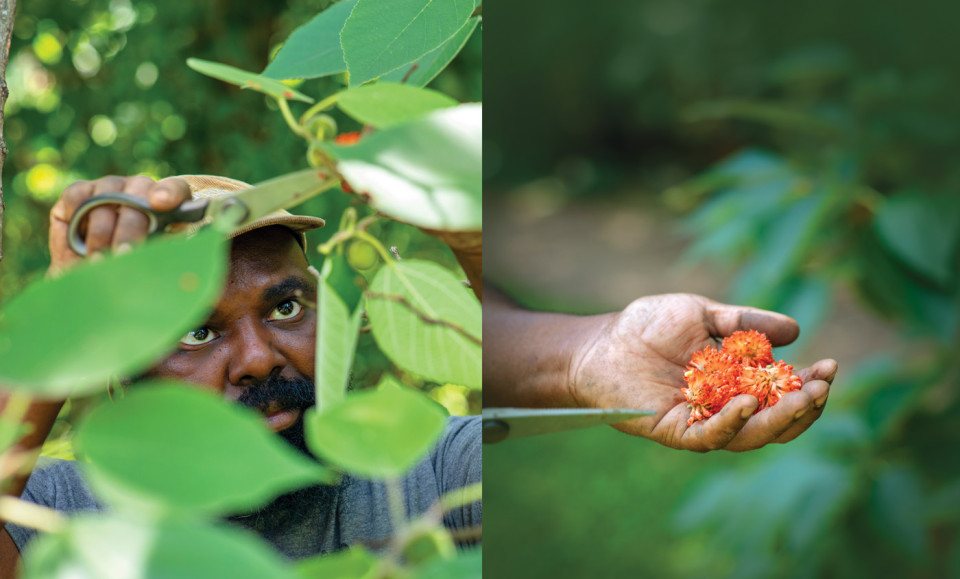
Photography by Sahar Coston-Hardy
For our September issue, food editor Kae Lani Palmisano put on her hiking boots, grabbed a basket, and took us inside the tasty, controversial world of foraging. You may think of foraging as a rural exercise, confined to the hills and hollows of faraway wilds. What Palmisano found, though, is a Philly foraging community hiding in plain sight: along the edges of suburban parking lots, under forgotten oak trees, and in the brambles of South Philly parks.
“Though foraging has been a means of survival since the dawn of humanity, wild foods have been gaining mainstream attention in recent years,” Palmisano wrote. “The pandemic lockdown drove many of us to find outdoor hobbies; TikTok influencers like Alexis Nikole are teaching millions how to identify milkweed and make pine cone jam; restaurants are leaning into hyperlocal menus to feed the public’s growing interest — the conditions for foraging to flourish are ripe.”
With that popularity, though, comes concerns: concerns about sustainability, land stewardship, and even legality. With the rise in popularity of foraging, will there be anything left? Keep reading here.
How a Vicious Legal Battle Over a Wildflower Farm Tore This Bucolic Philly Suburb Apart

Photography by Chris Baker Evens
The hell all started when Ryan and Lori Heenan decided to open a wildflower farm. The Chester County couple just wanted to sell a few homegrown peonies and wound up inadvertently opening Pandora’s toolshed.
Contributing writer Tom McGrath dug into an epic legal battle waged in the farmland of Chester County. It’s a gripping tale rich with zoning disputes and accusations of slander. It’s got horses, hounds, foxes, and a rooster that will not shut up. It’s a tale that features no shortage of fascinating characters, from a farmer and elected official who moonlights as a horror-movie maker to an actual moviemaker — Willistown resident M. Night Shyamalan — who moonlights as a farmer.
At the center of it all is a struggle as old as time: Who gets to live in our most beautiful places? Keep reading here.


